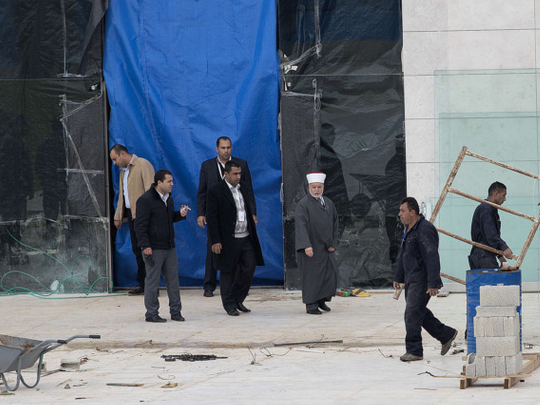
Ramallah: Palestinian authorities on Tuesday exhumed the remains of late leader Yasser Arafat, overriding cultural taboos against disturbing a gravesite to determine whether he was poisoned, as relatives and political successors have claimed.
The body of the former president was to be re-interred later in the day in a military ceremony. The results of the tests are expected to be known within days, or by the end of the year at the latest.
Arafat, an icon of Palestinian nationalism, died in a French military hospital in November 2004, a month after suddenly falling ill. The immediate cause of death was a stroke, but the underlying reasons were unclear, leading to widespread belief in the Arab world that Israel poisoned him — a claim Israel denies.
An investigation was launched at the time, but it then lay dormant for years, only to be revived this summer when a Swiss lab detected traces of a lethal radioactive substance in urine stains on his clothing.
On Tuesday morning, after several weeks of preparations, Arafat’s remains were taken from his mausoleum in Ramallah and moved to a nearby mosque, according to two Palestinian officials. The officials spoke on condition of anonymity because they were not authorised to discuss the exhumation with the media.
At the mosque, Palestinian physicians took samples from the remains and handed them to Swiss, French and Russian experts, the officials said. According to Islam, only Muslims can handle a Muslim’s remains. The foreign experts will examine the samples in their home countries, the officials said. Earlier, samples were also taken from Arafat’s bedroom, office and personal belongings, they said.
The Palestinian National Authority had earlier covered parts of Arafat’s mausoleum with a large sheet of blue tarpaulin to prevent any filming of the opening of the grave. Arafat was widely revered, and there were concerns that disturbing his grave could spark protests.
Public reaction in the occupied West Bank was mixed.
Nidaa Younes, a Palestinian government employee, said it was unnecessary to dig up the remains. “Our religion forbids exhuming graves. It is not nice at all to do this, even if religion permits it in some cases,” she said, adding that she believes Israel was responsible for Arafat’s death.
Ramallah resident Tony Abdo said he supports the exhumation, expecting it to prove that Arafat did not die a natural death.
Accusations that Arafat was poisoned revived after the Swiss laboratory, featured in a televised investigation by Al Jazeera, said it discovered elevated traces of polonium-210 on Arafat’s clothing.
Arafat’s widow, Suha, had handed over his medical file and what she said was a duffel bag of his belongings, including a fur hat and a woolen cap with some of his hair, a toothbrush, and clothing with his urine and blood stains.
The laboratory, Switzerland’s Institute of Radiation Physics, said the findings were inconclusive and that Arafat’s bones would have to be tested for more concrete proof. That prompted a request to have his remains exhumed, and Palestinian President Mahmoud Abbas, Arafat’s successor, approved the request this summer.












